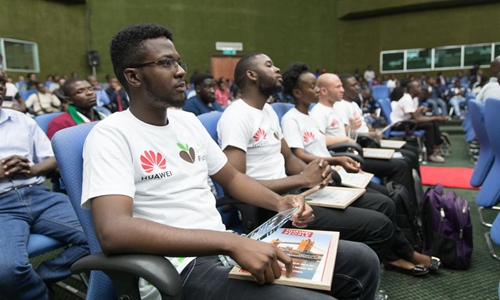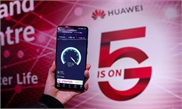
Students awarded by Huawei's Seeds for the Future Programs attend a launch ceremony in Lusaka, Zambia, on Oct. 4, 2019. (Xinhua/Peng Lijun)
Huawei founder and CEO Ren Zhengfei said that some developed economies' efforts to shift industry chains to their own countries is the wrong move, because only through globalization a country could sharpen its competitiveness.
"No country can build an entire industrial chain on its own - as the cost is extremely high," Ren told a domestic magazine named Loong (dragon) recently. He said Huawei purchased $18.7 billion worth of components from the US market in 2019, a significant jump from the previous annual $11 billion imports.
Huawei likely increased procurement of US-manufactured components in 2019 for fear of supply cuts amid the China-US trade war. The ratcheted-up imports of US components also indicates US companies' reliance on China's huge market, an industry veteran surnamed Fu told the Global Times on Sunday.
Wei Jianguo, a former Chinese vice commerce minister, told the Global Times that the coronavirus pandemic would accelerate the shift of high-end industries and technological investment to Northeast Asia, as China, Japan and South Korea are taking the lead in economic recovery from the virus.
"After the onslaught of the coronavirus fades, global industry chains will gravitate to regions with high consumption growth, for example, China," Wei said, noting that China's retail sales are expected to reach 45 trillion yuan ($6.35 trillion) in 2020, surpassing the US to be the largest consumption market.
During the interview, Ren said that Huawei has no intention of replacing US components in its smartphones, adding that "the US is always a good friend" of Huawei. Proposals by a few American politicians can't represent the US government's opinion. Many US companies have won approval from the US Commerce Department to provide components for Huawei, Ren said.
"Of course, we can replace all US components, but what if consumers don't buy Huawei smartphones then?" he said, noting that it would be a long time before Huawei's operating system could catch up with Android and that of Apple.
He said that Huawei rolled out its own operating system not to engage in vicious competition but as a backup choice if others banned Huawei from using their software.
Amid external pressure, Huawei has been promoting the HMS, its replacement for Google's apps and services. Richard Yu, CEO of the Huawei Consumer Business Group, said during the launch event in Paris that HMS has now garnered more than 4 million monthly active users and 1.3 million developers and partners globally, and it is available in more than 170 countries and regions.
But the company still needs to attract more software developers to build a complete ecosystem. That would help its self-developed HarmonyOS operating system rapidly spread in popularity and replace Android, industry analysts said.


